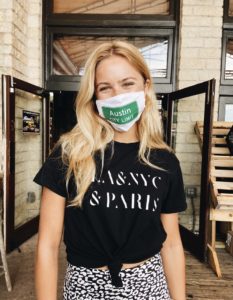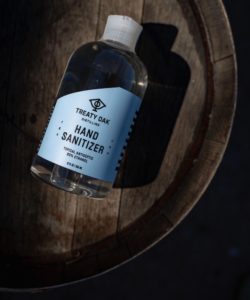The COVID-19 Pivot

Starting in March, Austin seemed to turn upside down. Protective face masks and hand sanitizer became necessary for everyday life and essential workers charged forward, carrying the city on their backs. It didn’t take long before a shortage of those sanitation products and masks added to the city’s collective anxiety. Austinites rose to the challenge, and small businesses and distilleries across the area stepped up to offer what they could.
Many businesses and organizations around Austin began making and carrying masks as soon as they realized the need — places like Ace Tailors, Austin School of Fashion and Design, and Mozart’s Coffee Roasters, just to name a few.
On March 17, just two days after the initial lockdown, one of Austin’s favorite, lake-side cafes, Mozart’s Coffee Roasters, received a call from a local fashion designer. She wanted to start making masks and selling them through Mozart’s.
“At first, we were reluctant to the request to carry the line. The pandemic was new. We were, like everyone, figuring out how to survive and operate in what would become a new ‘normal,’” Co-owner of Mozart’s Ken Leonard says. “Fast forward to a matter of days — and this inquiry actually became a catalyst for our decision to make many pivots.”

Courtesy of Mozart’s Coffee Roasters.
Leonard says the demand for the masks increased instantaneously, lining customers out the door and creating requests for more. In response to the ever-growing demand, Leonard called up some family and friends and set up another line of masks, sewed by nurses.
“Business exceeded anyone’s expectations by a factor of 10,” Leonard says. “We ultimately carry in e-commerce and direct retail mode five different lines of masks.”
The nurse-made masks have since sold over the 10,000 mark and a second line, also created by Leonard and his company, has sold over 35,000 masks. When asked about the future of the mask lines, Leonard says the course of the pandemic is unpredictable and there is just no way to know what the post-COVID-19 world will look like.

Courtesy of Mozart’s Coffee Roasters.
“We do maintain each of the lines, the inventory, and availability and will continue to offer a personal protective equipment source for our community — both locally and nationally online,” he says.
In turn, in regard to hand sanitizer, distilleries like Tito’s, Hye Rum and Treaty Oak Distilling were quick in their response to the pandemic’s demands as well. For Treaty Oak, the conversation began on March 20, and within two weeks they were producing hand sanitizer and filling orders.
“In very short order, we saw the need to produce sanitizer in order to serve the community in time of crisis as well as create a lifeline to keep our employees and company afloat,” Director of Science and Sustainability at Treaty Oak Distilling Jamie Biel says.
Navigating the constantly changing legalities and all of the minute details were a lot to take on, Biel says, but nonetheless, they were able to get everything together in a matter of weeks — all the while continuing to offer to-go orders and delivery from their restaurant and finding ways to provide food to families in need.
Among the chaos, the team was able to provide gallons of hand sanitizer to the likes of the City of Austin, the Department of Justice, and even NASA. The team had to put in long hours devoted to new jobs of hand sanitizer production and bottle filling. Biel says that as soon as they had a product to sell, it was sold out.

Courtesy of Treaty Oak Distilling.
“The urgency behind the deals was palpable. It takes time to batch and fill bottles, arrange shipping, process invoices. But for lots of these people, this meant life and death,” Biel says. “As such, we worked our butts off all day every day to make this happen.”
Once HEB and Whole Foods began carrying the hand sanitizer, Biel says they switched the production to glass bottles on the bottling line to ramp up production time.
“Looking back, it was a symphony of moving parts — we all did our jobs as well as we could and without any one person involved, we could not have done it,” Biel says. “I really feel proud of my team.”
Now that demand has dropped, Treaty Oak Distilling is using that brewery equipment to brew beer, and they’re back to crafting their whiskey and gin.
“Needless to say, the thousands of gallons of sanitizer we produced and sold during the last eight months was a good thing; we are so glad to be back to mashing in everyday, but we could not have done it without sanitizer.”
With so much uncertainty about the future, it’s nice to know that when things get tough, Austinites are always ready to step up and help out.
- covid19 pivot
- hand sanitizer
- local businesses
- making masks
- mozart's coffee roasters
- treaty oak distilling






